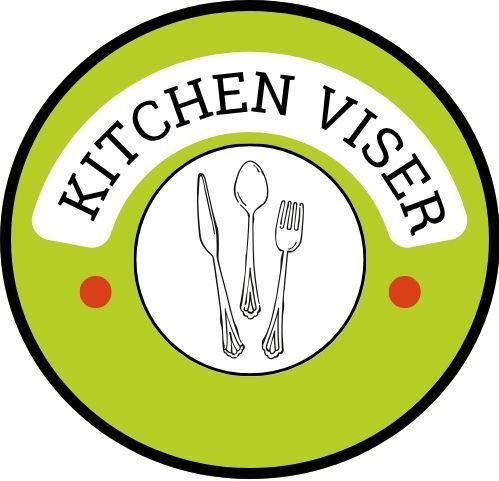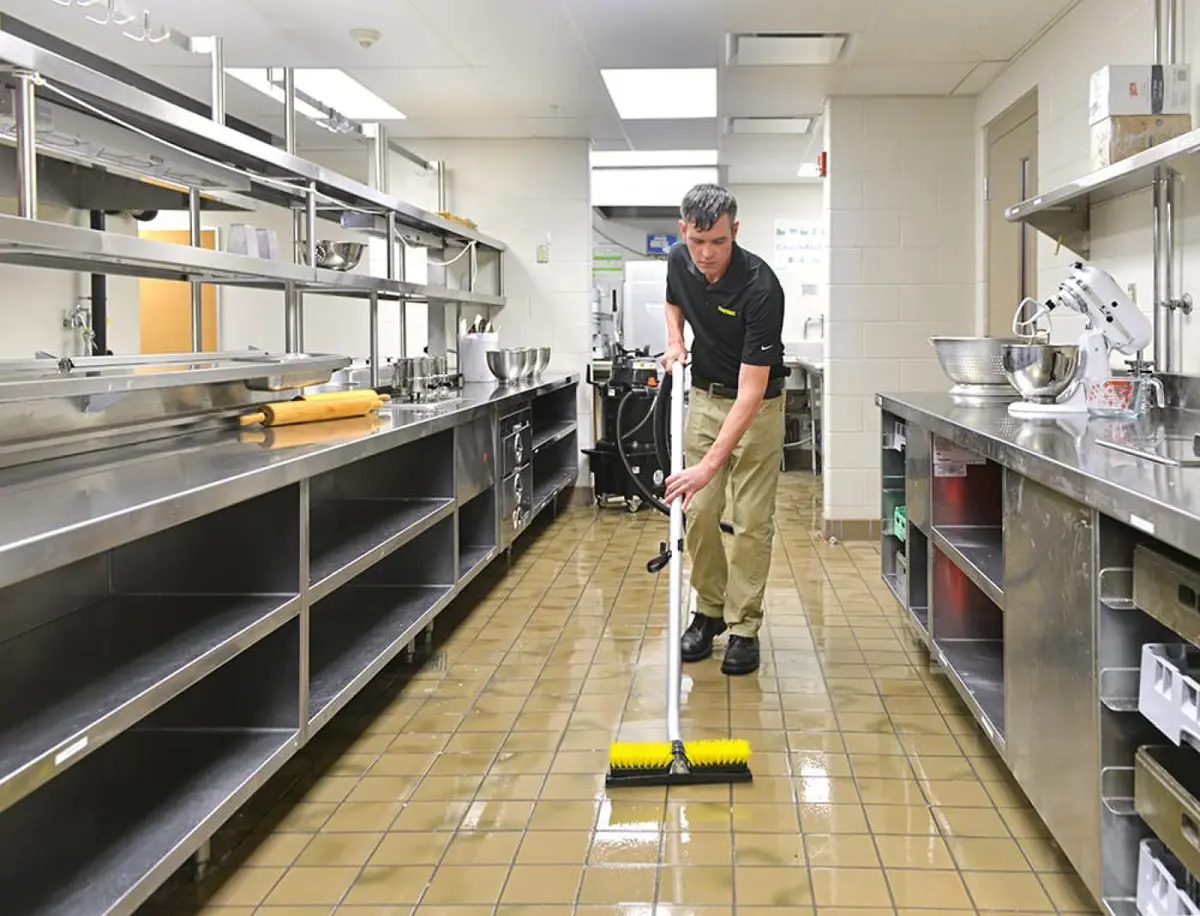Are you tired of spending countless hours scrubbing and scrubbing, only to find stubborn grime still clinging to your commercial kitchen surfaces? You’re not alone.
Keeping a commercial kitchen spotless is crucial, not just for compliance and safety, but also to ensure that your culinary creations shine. Imagine a space where every surface sparkles, and cleaning becomes less of a chore and more of a breeze.
In this guide, we’re diving into the best commercial kitchen cleaning hacks that will transform your workspace into a pristine haven. You’ll discover clever tips and tricks that are not only effective but also surprisingly simple. Ready to make your kitchen gleam without breaking a sweat? Let’s get started!

Credit: www.pinterest.com
Importance Of A Clean Kitchen
A clean kitchen boosts hygiene and safety. Discover commercial kitchen cleaning hacks for spotless surfaces and germ-free spaces. Keep your cooking environment pristine with simple, effective methods.
A clean commercial kitchen is not just about appearance; it’s about safety, efficiency, and compliance. A spotless kitchen ensures that your food preparation areas are free from harmful bacteria and allergens, which can prevent foodborne illnesses. Moreover, maintaining a clean kitchen boosts employee morale and productivity, allowing your team to focus on creating delicious dishes.Why Hygiene Matters
Keeping your kitchen hygienic is crucial for safeguarding your customers’ health. Dirty surfaces can harbor bacteria and pests, posing serious health risks. Regular cleaning minimizes these threats and keeps your business compliant with health regulations.Enhancing Efficiency
A tidy kitchen allows for smoother operations. When everything is clean and organized, your team can find what they need without delay. This efficiency can lead to faster service and happier customers.Boosting Employee Morale
No one likes working in a cluttered, dirty environment. A clean kitchen can make your staff feel valued and motivated. This positive atmosphere can lead to better teamwork and creativity.First Impressions Count
Imagine walking into a restaurant and catching a glimpse of a messy kitchen. Would you want to eat there? A clean kitchen not only reassures customers but also enhances your establishment’s reputation.Practical Cleaning Hacks
Have you ever tried using vinegar for tough stains? It’s an effective, natural solution for cutting through grease. Baking soda is another handy item that can deodorize and scrub surfaces without scratching them.Engage Your Team
Involve your staff in the cleaning process. Assign specific tasks and rotate them to keep things fresh and fair. This not only ensures thorough cleaning but also fosters a sense of responsibility and teamwork.Consistency Is Key
Consistency in cleaning routines is vital. Setting a schedule helps maintain high standards and prevents daunting deep-cleaning sessions. Regularly cleaned kitchens are easier to manage and less stressful for everyone involved. How often do you evaluate your kitchen’s cleanliness? Implement these hacks and see how they transform your kitchen environment, ensuring it remains a safe and efficient place to create culinary masterpieces.Essential Cleaning Tools
Keeping a commercial kitchen clean is crucial. Essential cleaning tools make this task easier. These tools save time and ensure thorough cleaning. They help maintain hygiene standards and prolong equipment life. Let’s explore the key tools needed for a spotless kitchen.
Microfiber Cloths
Microfiber cloths are perfect for cleaning surfaces. They trap dirt and dust effectively. These cloths are reusable and eco-friendly. Use them for countertops, tables, and appliances.
Heavy-duty Scrub Brushes
Scrub brushes tackle stubborn stains. They’re great for grills and ovens. Choose brushes with strong bristles. They remove grime without damaging surfaces.
Industrial-grade Degreasers
Degreasers are essential for removing grease. Industrial-grade degreasers work fast. They dissolve grease and leave surfaces clean. Use them on stovetops and exhaust hoods.
Steam Cleaners
Steam cleaners sanitize surfaces. They kill germs and bacteria. Steam is safe for most kitchen equipment. Use steam cleaners for deep cleaning tasks.
Floor Scrubbers
Floors require regular cleaning. Floor scrubbers make this easy. They clean large areas quickly. Choose scrubbers with adjustable settings for different floor types.
Spray Bottles
Spray bottles are versatile. Fill them with cleaning solutions. Use them to mist surfaces before wiping. They help distribute cleaning agents evenly.
Daily Cleaning Routine
Maintaining a clean commercial kitchen is vital. It ensures safety and hygiene. A daily cleaning routine simplifies this task. It prevents the build-up of dirt and grime. Consistent cleaning also extends the life of kitchen equipment. Let’s explore some efficient cleaning hacks for your kitchen.
Surfaces And Appliances
Wipe surfaces daily with a damp cloth. Use a mild detergent. This removes food particles and spills. Pay special attention to countertops and prep areas. For appliances, like ovens and microwaves, ensure they’re cool before cleaning. A mixture of baking soda and water works wonders on stubborn stains. Rinse with clean water and dry with a towel. Regular cleaning keeps appliances running smoothly.
Floors And Walls
Sweep floors at the end of each shift. This prevents dirt accumulation. Mop with a suitable cleaner to remove sticky residues. For walls, focus on areas near cooking stations. Grease tends to build up quickly. A simple solution of vinegar and water can tackle grease stains. This method keeps walls clean without harsh chemicals.
Ventilation Systems
Clean ventilation hoods weekly. They trap grease and smoke particles. Remove and wash filters in warm, soapy water. Check exhaust fans for any blockages. This ensures proper airflow. Proper maintenance of ventilation systems keeps kitchen air fresh and reduces fire risks. Regular checks and cleaning are key to a safe kitchen environment.
Deep Cleaning Techniques
Deep cleaning a commercial kitchen is essential for maintaining hygiene and safety. Regular cleaning might not reach every corner where grime builds up. Deep cleaning techniques ensure every nook is spotless. It also helps in extending the life of kitchen equipment. Let’s explore some effective deep cleaning hacks.
Ovens And Grills
Ovens and grills often accumulate stubborn grease and food residue. Start by removing all racks and trays. Soak them in warm, soapy water. Use a baking soda paste to scrub the interior of the oven. Let the paste sit for 30 minutes. Wipe it clean with a damp cloth. For grills, scrape off food particles with a grill brush. Use white vinegar to cut through grease. Rinse thoroughly for a sparkling finish.
Refrigerators And Freezers
Deep cleaning refrigerators and freezers keeps food safe. Empty the contents and unplug the appliance. Remove shelves and drawers. Wash them with mild detergent. Use a mixture of water and baking soda to clean the interior. It neutralizes odors effectively. Check and clean the door seals with a damp cloth. This prevents mold growth.
Dishwashers And Sinks
Dishwashers and sinks can harbor bacteria and odors. For dishwashers, remove the filter and wash it separately. Place a cup of white vinegar on the top rack. Run a hot water cycle. This removes buildup and disinfects. Clean the sink with baking soda and lemon juice. This combination removes stains and freshens the sink. Rinse well to leave surfaces gleaming.
Eco-friendly Cleaning Solutions
Embracing eco-friendly cleaning solutions in commercial kitchens has many benefits. These solutions promote a healthier environment and reduce harmful chemical exposure. They can also cut costs and lessen environmental impact. Here are some effective, green cleaning hacks for commercial kitchens.
1. Baking Soda for Stain RemovalBaking soda is a versatile cleaning agent. It effectively removes stains and odors from kitchen surfaces. Mix baking soda with a little water to form a paste. Apply it to stubborn stains and scrub gently for a clean result.
2. Vinegar for Grease and GrimeVinegar is a natural degreaser. It cuts through grease and grime easily. Use a spray bottle to apply vinegar on greasy surfaces. Let it sit for a few minutes, then wipe clean with a damp cloth.
3. Lemon Juice as a DisinfectantLemon juice is a natural disinfectant. Its acidity helps kill germs and bacteria. Apply fresh lemon juice on cutting boards and countertops. Let it sit for a while before rinsing to ensure cleanliness.
4. Essential Oils for FreshnessEssential oils add a pleasant aroma to your kitchen. They also have antibacterial properties. Add a few drops of essential oil to your cleaning solution. This not only cleans but also refreshes the air.
5. Cornstarch for Window CleaningCornstarch can clean windows effectively. Mix cornstarch with water and vinegar for a streak-free finish. Use a microfiber cloth for best results. This mixture leaves windows sparkling clean and clear.
6. Hydrogen Peroxide for SanitizingHydrogen peroxide is a powerful sanitizer. Use it to clean countertops and appliances. It kills bacteria without leaving harmful residues. Ensure you rinse surfaces well after using hydrogen peroxide.

Credit: www.tiktok.com
Time-saving Hacks
Cleaning a commercial kitchen can be a daunting task. Time-saving hacks can make this process easier and quicker. With the right strategies, you can keep your kitchen sparkling without wasting hours.
Multi-tasking Strategies
Use downtime to tidy up. While waiting for water to boil, wipe down counters. Clean while you cook. Scrub pots while simmering sauces. Organize tasks to reduce idle time. Keep cleaning supplies nearby. A quick spray can save minutes later. Efficient multi-tasking keeps your kitchen spotless.
Efficient Scheduling
Create a cleaning schedule. Assign specific tasks for each day. This prevents overwhelming workloads. Prioritize high-traffic areas. Clean these daily to maintain hygiene. Delegate tasks to staff. Share the workload for faster results. Set reminders for deep cleaning days. Consistent routines keep the kitchen in top shape.
Preventive Maintenance Tips
Preventive maintenance in commercial kitchens saves time and money. Regular care avoids costly repairs. Kitchen equipment lasts longer with proper upkeep. Clean equipment works efficiently. It helps maintain hygiene standards. Implementing simple tips ensures a well-functioning kitchen.
Regular Inspection
Check equipment weekly. Look for wear and tear. Identify issues early. Fix small problems before they worsen. Use a checklist for thorough inspections.
Deep Cleaning Schedule
Plan monthly deep cleans. Focus on hard-to-reach areas. Remove built-up grime. Use professional-grade cleaners. Clean behind appliances. This prevents mold and bacteria.
Filter Maintenance
Clean filters regularly. Dust accumulates quickly. Dirty filters strain equipment. Replace filters if damaged. Clean filters improve air quality.
Lubricate Moving Parts
Lubricate hinges and gears monthly. Reduce friction. Prevent wear and tear. Use food-safe lubricants. Ensure smooth operation.
Temperature Calibration
Calibrate ovens and fryers quarterly. Ensure accurate cooking. Prevent undercooked food. Use a thermometer for checks. Maintain consistent temperature settings.
Drain Care
Clean drains weekly. Prevent clogs and odors. Use enzyme cleaners. Remove food particles. Maintain proper drainage flow.
Regular Staff Training
Train staff on equipment care. Teach cleaning techniques. Emphasize safety protocols. Ensure proper equipment handling. Staff awareness prevents accidents.
Documentation
Keep maintenance records. Note repairs and inspections. Track cleaning schedules. Use logs for reference. Ensure accountability and consistency.

Credit: www.tiktok.com
Safety Precautions
Ensure staff wear gloves and goggles during cleaning. Use non-toxic cleaners to prevent harmful fumes. Regularly check equipment for leaks to avoid accidents.
Cleaning a commercial kitchen isn’t just about keeping it spotless; it’s about ensuring safety for everyone involved. A clean kitchen reduces the risk of accidents and food contamination. However, knowing the best cleaning hacks means nothing without understanding the safety precautions involved. Let’s explore some essential safety measures to keep in mind while maintaining your kitchen’s cleanliness.Understanding Chemical Labels
Always read and understand the labels on cleaning products. These labels contain vital information about the chemicals you’re using, including potential hazards and safe handling instructions. If you’ve ever experienced a skin rash from cleaning, you know how important it is to follow these instructions carefully.Proper Ventilation
Ensure your kitchen is well-ventilated when using strong cleaning agents. This helps disperse any harmful fumes that could affect your breathing. Open windows or use exhaust fans to keep the air fresh and your lungs happy.Wear Protective Gear
Don’t skip the gloves and goggles. Protective gear shields you from harmful chemicals and accidental splashes. Have you ever accidentally splashed bleach on your clothes? It’s not pleasant, and wearing an apron can prevent such mishaps.Cleaning Equipment Safety
Inspect your cleaning equipment regularly to ensure it’s in good condition. A faulty machine can cause accidents or fail to clean effectively. Check cords and attachments, and if something seems off, repair or replace it immediately.Storage Of Cleaning Products
Store cleaning products in a designated area, away from food and out of reach of unauthorized personnel. Storing them incorrectly can lead to accidental poisoning or contamination. Always lock them up to ensure safety.Training Your Team
Conduct regular training sessions for your staff on safe cleaning practices. Ensure everyone knows how to use cleaning products and equipment safely. Engaging your team in safety drills can prevent accidents and keep everyone on the same page. Remember, safety is a shared responsibility. Next time you’re gearing up to clean your kitchen, ask yourself: Are you prepared to protect yourself and your team?Expert Advice And Resources
Keeping a commercial kitchen spotless is crucial for health and efficiency. Expert advice and resources can make this task easier. Professionals know the tricks to tackle tough grime and maintain cleanliness. They share insights that save time and resources. Let’s explore some expert tips and resources that can help keep your kitchen shining.
Expert Tips For Cleaning Efficiency
Experts suggest using a checklist. It ensures no area is overlooked. Regular cleaning prevents build-up. Focus on high-touch areas like countertops and handles. A clean kitchen prevents health risks and maintains a good reputation.
Choosing The Right Cleaning Products
Use eco-friendly cleaning products. They are safe and effective. Experts recommend biodegradable options. These products clean well without harming surfaces. Read labels for ingredients and usage instructions. Proper use ensures the best results.
Proper Equipment Maintenance
Maintaining equipment is key for a clean kitchen. Experts advise regular inspections. Clean ovens, fryers, and refrigerators frequently. It prolongs their lifespan and keeps them efficient. Follow manufacturer guidelines for cleaning and maintenance.
Training Staff For Cleanliness
Train staff on proper cleaning techniques. Experts stress the importance of routine training. This ensures everyone knows the best practices. Effective training improves cleaning speed and quality. It fosters a culture of cleanliness in the kitchen.
Utilizing Online Resources
Online resources offer valuable cleaning insights. Blogs, forums, and videos provide tips and tricks. Experts often share their experiences online. These resources are accessible and easy to understand. They are helpful for solving specific cleaning challenges.
Frequently Asked Questions
What Are Essential Tools For Kitchen Cleaning?
A commercial kitchen needs durable brooms, mops, scrub brushes, and microfiber cloths. These tools help keep surfaces spotless.
How Often Should A Kitchen Be Cleaned?
Clean daily to maintain hygiene. Regular wiping, sweeping, and mopping prevent dirt buildup and ensure a safe environment.
Can Natural Cleaners Be Used In Kitchens?
Yes, vinegar and baking soda are effective. They clean surfaces without harsh chemicals, making them safe for food areas.
What Are Some Quick Cleaning Hacks?
Use lemon juice to remove stains. Baking soda for scrubbing. Hot water helps loosen grime. Simple and effective methods.
Conclusion
Cleaning a commercial kitchen can feel overwhelming. These hacks simplify the process. Try using vinegar for stubborn stains. Baking soda works wonders on greasy surfaces. Don’t forget to regularly deep-clean equipment. It keeps everything running smoothly. Always use the right tools for each task.
This saves time and energy. A clean kitchen enhances food safety. It also improves efficiency and hygiene. With these tips, maintaining a spotless kitchen becomes easier. Clean kitchens mean happy customers and staff. So, keep these hacks in mind. Your kitchen will thank you.
Happy cleaning!

Yes, working as , Food Blogger and Product Reviewer for last 6 years. Here you will get amazing deals for Smart kitchen products. I am your best source for the latest update in cooking trends. I provide insightful articles, reviews, and analysis on cutting-edge kitchen gadget. My mission is to empower readers with the knowledge they need to stay ahead in a rapidly evolving coking world. Join me as we explore the future of food technology and how it shapes our lives today and tomorrow.




